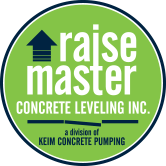Raise Master
Frequently Asked Questions
FAQs
- What is concrete leveling?
Concrete leveling-also known as concrete raising, mudjacking or slabjacking- is the process of raising sunken concrete by pumping a thick fluid beneath. When the fluid dries, it forms a permanent new base, or substrate, under the old concrete. In the early days topsoil was the preferred pumping material, giving rise to the term “mudjacking”. Over time, improved pumps have allowed us to drill smaller holes, and use more stable, dense materials like sand and powdered limestone. When actual mud began to disappear from mudjacking, the terms slabjacking and Concrete Leveling became more popular.
- How much does it cost?
The price varies with the job, but typically concrete leveling will save you between 50% and 75% when compared to the cost of replacement. And, you'll find our prices are competitive even among concrete levelers.
- How long will it take?
The short answer is, as long is it takes to do the job right. But the average job takes several hours. Very small jobs may take an hour, and the largest jobs will take the whole day. Some companies do the job faster. But in our experience, greater speed means lower quality, and we would rather do it right than squeeze an extra job into the day.
- How long will it last?
Generally the leveling will last the life of the concrete.
- How long until I can use it again?
You can walk on your concrete immediately, but we recommend you wait at least two hours before you drive on it. It is uncommon, but the weight of a car can sometimes shift leveled concrete if the grout is still wet.
- Can you level cracked concrete
Yes, but we like to see most of the concrete in large pieces.
- You said you'll drill holes in my concrete? How big are they?
One inch, or about the size of a quarter.
- What are you pumping?
Raise Master grout is a mixture of limestone and water with Portland cement added as needed for extra support. Some companies still use topsoil or silt to save money, but we feel that denser limestone does a better, longer lasting job.
- Will the grout hurt my flowers/lawn/pets?
No. Our limestone grout is no more dangerous than ordinary mud.
- My concrete is covered in grout! Will you clean up this mess?
Yes. The grout can make an awful mess, but we'll clean it up before we patch the holes.
- Will leveling my concrete damage the foundation to my house?
No. Even if the grout comes into contact with the foundation of your home, the weight of the concrete is distributed evenly across all of the material beneath it. The pressure in any one spot is so light that we routinely use a small piece of wood, foam, or even bare hands to hold back the flow of grout when gaps occur during pumping.
